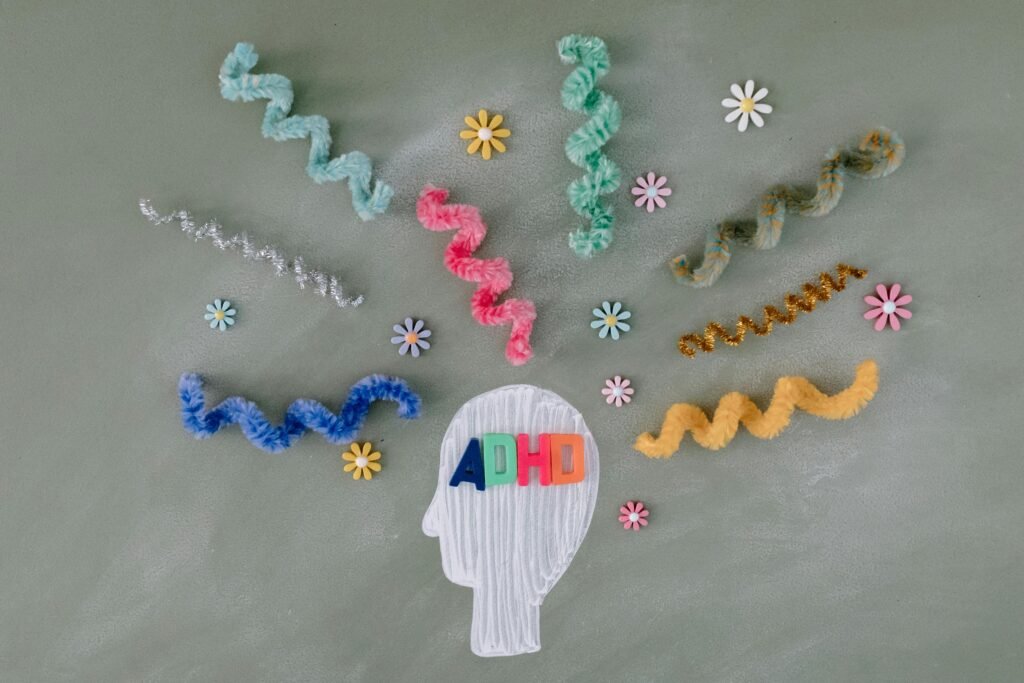ADHD Treatment in Ashburn, VA: Find Expert Care Near You
Evidence-based treatment, compassionate care, and practical strategies to help you or your loved one thrive—right here in Ashburn, VA.
If you or someone you care about struggles with staying organized, managing time, or maintaining focus—whether at school, work, or home—you're not alone. Attention-Deficit/Hyperactivity Disorder (ADHD) affects millions of children, teens, and adults across the United States, including right here in Ashburn and throughout Northern Virginia.
ADHD isn't about laziness, lack of intelligence, or poor character. It's a neurobiological condition that impacts how the brain regulates attention, impulse control, and activity levels. The good news? With the right combination of evidence-based therapies, practical strategies, and compassionate support, people with ADHD can harness their creativity, energy, and unique strengths to succeed in every area of life.
This guide will walk you through everything you need to know about ADHD in Ashburn: what it is, how to recognize the signs, when to seek professional help, and how to access comprehensive, personalized treatment near you. Whether you're a parent concerned about your child's school performance, an adult finally connecting the dots on lifelong challenges, or a college student seeking accommodations, Conscientia Health and the broader Ashburn community are here to support you every step of the way.
What Is ADHD and How Does It Affect Daily Life?
ADHD is one of the most common neurodevelopmental disorders, typically first diagnosed in childhood but often persisting into adolescence and adulthood. According to the National Institute of Mental Health (NIMH), ADHD is characterized by a persistent pattern of inattention and/or hyperactivity-impulsivity that interferes with functioning or development.
Core Symptoms of ADHD
Inattention
People with inattentive ADHD often find it challenging to sustain attention during tasks, conversations, or lectures, leading to frequent careless mistakes in schoolwork, at work, or during other activities. They may appear not to listen when spoken to directly, even when there's no obvious distraction. Organizing tasks and managing time becomes a persistent struggle, as does following through on instructions or completing projects.
Those with inattention symptoms typically avoid or dislike tasks requiring sustained mental effort, such as lengthy reports or detailed paperwork. They frequently lose items necessary for daily tasks—keys, phones, paperwork, glasses—and find themselves easily distracted by unrelated thoughts or external stimuli. This pattern of forgetfulness extends across daily activities, from missed appointments to forgotten commitments, creating frustration for both the individual and those around them.
Hyperactivity and Impulsivity
- Fidgeting, tapping hands or feet, or squirming in seat
- Leaving seat in situations when remaining seated is expected
- Running or climbing in inappropriate situations (in children); restlessness in adults
- Inability to engage in leisure activities quietly
- Being "on the go" or acting as if "driven by a motor"
- Talking excessively
- Blurting out answers before questions are completed
- Difficulty waiting one's turn
- Interrupting or intruding on others
The American Psychiatric Association recognizes three presentations of ADHD in the DSM-5: predominantly inattentive, predominantly hyperactive-impulsive, and combined presentation (both inattentive and hyperactive-impulsive symptoms).
ADHD and Executive Function
Beyond the core symptoms, ADHD significantly impacts executive functions—the mental skills that help us plan, focus attention, remember instructions, and juggle multiple tasks. These include:
- Working memory: Holding and manipulating information in mind
- Cognitive flexibility: Adapting to new information or changing demands
- Inhibitory control: Resisting impulses and distractions
- Planning and organization: Setting goals and determining steps to achieve them
- Time management: Estimating how long tasks will take and meeting deadlines
- Emotional regulation: Managing frustration, disappointment, and excitement
Challenges with executive function can make everyday tasks—like getting ready for school, completing a work project, or managing household responsibilities—feel overwhelming. Understanding that these difficulties stem from neurological differences, not personal failings, is the first step toward effective support.
ADHD Strengths
It's crucial to recognize that ADHD comes with strengths as well as challenges. Many people with ADHD are highly creative, energetic, spontaneous, and able to hyperfocus on topics that captivate them. They often think outside the box, bring enthusiasm to projects, and excel in dynamic, fast-paced environments. With the right support systems in place, these strengths can be powerful assets in school, career, and personal life.
Research from organizations like CHADD (Children and Adults with ADHD) emphasizes that multimodal treatment—combining behavioral interventions, skills training, environmental modifications, and medication when appropriate—produces the best long-term outcomes for individuals with ADHD.
Ready to Take the First Step?
Understanding ADHD is just the beginning. Let our expert team help you or your loved one access comprehensive assessment and personalized treatment right here in Ashburn.

Signs and Impacts Across the Lifespan
ADHD looks different at different ages and in different contexts. Recognizing the signs early—and understanding how they evolve—can help you or your loved one access timely, effective support.
ADHD in Children (Ages 4–12)
In young children, ADHD often first becomes noticeable in preschool or early elementary school, when demands for sustained attention and behavioral control increase. Children may have difficulty sitting still during circle time, meals, or homework sessions, often squirming or fidgeting when stillness is expected. They frequently lose school supplies, jackets, or lunchboxes, and struggle to follow multi-step directions that their peers manage without difficulty.
Social challenges often emerge as these children interrupt teachers or peers and have difficulty waiting for their turn in games or conversations. They may appear not to listen when spoken to directly, and despite understanding the material, they make careless mistakes on assignments. Completing chores or homework without constant reminders becomes a source of ongoing frustration for both children and parents. Emotional outbursts and low frustration tolerance are common, as children struggle to regulate their responses to everyday challenges.
Teachers and parents may describe the child as "always on the go," "daydreaming," or "not working up to potential." It's important to note that ADHD is not related to intelligence—many children with ADHD are bright and capable but struggle with the organizational and self-regulation demands of school.
ADHD in Teens (Ages 13–18)
As children with ADHD enter adolescence, hyperactivity often decreases, but inattention and executive function challenges persist—and can intensify as academic and social demands grow. Chronic procrastination becomes more pronounced, with teens struggling to start or finish long-term projects even when they understand the importance. Poor time management manifests in being frequently late or missing deadlines, despite having calendars and reminders. Their backpacks, lockers, and bedrooms often remain disorganized chaos zones, and they may forget to turn in homework they actually completed, leading to frustration from teachers and parents alike.
Studying for exams and planning ahead present significant challenges, as teens with ADHD struggle to break down complex tasks and allocate time appropriately. Impulsive decision-making can lead to risky behaviors, unwise spending, and social conflicts that strain friendships. Many teens develop low self-esteem or deep frustration about "not living up to potential," especially when they receive messages that they're "smart but lazy." Increased conflict with parents or teachers over responsibilities becomes common as expectations rise but executive function skills lag behind.
Teens with ADHD are at higher risk for academic underachievement, social difficulties, and co-occurring conditions like anxiety or depression. Early intervention and support—including accommodations, therapy, and skills coaching—can make a profound difference during these formative years.
ADHD in Adults
Many adults with ADHD were never diagnosed as children. They may have developed coping strategies that worked in structured school environments but break down under the demands of college, career, parenting, or managing a household. These adults often experience chronic disorganization at home or work, with cluttered desks, missed deadlines, and difficulty prioritizing tasks or managing multiple projects simultaneously. Procrastination becomes a persistent pattern, especially when faced with tedious or complex tasks that require sustained mental effort.
Forgetfulness permeates daily life—missing appointments, forgetting to pay bills, or constantly losing items like keys and wallets. Many adults with ADHD report feeling restless or having difficulty relaxing, even during leisure time. Impulsive decision-making can manifest in various ways, from unplanned spending and sudden job changes to hasty relationship decisions. In professional and social settings, they may struggle to listen attentively during meetings or conversations, finding their minds wandering despite their best efforts to focus.
The cumulative effect of these challenges often leads to feeling overwhelmed by daily responsibilities and experiencing low self-esteem or a persistent sense of underachievement. Adults with ADHD may also experience challenges in relationships, as partners or family members may misinterpret symptoms as carelessness or lack of interest. Understanding ADHD as a neurological condition—not a character flaw—can transform these dynamics and open the door to effective treatment.
The NICE (National Institute for Health and Care Excellence) ADHD guideline emphasizes that ADHD is a lifespan condition requiring ongoing, individualized support tailored to each person's developmental stage and functional needs.
Recognize the Signs? We Can Help
Whether you're concerned about your child, teen, or experiencing challenges yourself, early intervention makes all the difference. Connect with our compassionate ADHD specialists in Ashburn today.

Assessment and When to Seek Help
If you recognize several of the signs above—and they're causing significant difficulty at school, work, or home—it's time to seek a professional evaluation. Early, accurate diagnosis is the foundation for effective treatment and can prevent years of frustration, underachievement, and low self-esteem.
What Does an ADHD Assessment Involve?
A comprehensive ADHD evaluation typically includes:
- Clinical interview: A detailed discussion of current symptoms, developmental history, family history, and functional impacts across multiple settings (home, school, work, relationships)
- Standardized rating scales: Questionnaires completed by the individual and (for children) parents and teachers to assess symptom frequency and severity
- Review of records: School report cards, previous evaluations, or work performance reviews to identify long-standing patterns
- Screening for co-occurring conditions: Anxiety, depression, learning disabilities, and other conditions that often accompany ADHD
- Cognitive or neuropsychological testing (when indicated): To assess attention, working memory, processing speed, and executive function
The American Academy of Pediatrics (AAP) provides clinical guidance emphasizing that ADHD diagnosis should be based on DSM-5 criteria and include input from multiple sources and settings.
Who Can Diagnose ADHD?
ADHD can be diagnosed by qualified healthcare professionals, including:
- Psychiatrists
- Psychologists
- Licensed clinical social workers or counselors with specialized training
- Pediatricians or family physicians (often in consultation with specialists)
- Nurse practitioners with mental health expertise
In Ashburn and Northern Virginia, Conscientia Health offers comprehensive ADHD assessments for children, teens, and adults, conducted by experienced clinicians who understand the nuances of ADHD across the lifespan.
When Should You Seek an Evaluation?
Consider seeking an ADHD evaluation if:
- Symptoms have been present for at least six months
- Symptoms occur in multiple settings (not just at school or just at home)
- Symptoms cause significant impairment in academic, occupational, or social functioning
- Symptoms are not better explained by another condition
- You or your child are experiencing low self-esteem, academic underachievement, or relationship difficulties related to attention or impulse control
Don't wait for a crisis. Early intervention can prevent secondary problems like academic failure, social isolation, or mental health challenges. If you're unsure whether an evaluation is needed, reach out to Conscientia Health for a consultation—our team can help you determine the best next steps.
ADHD Support Options: What Works?
Effective ADHD treatment is multimodal, meaning it combines several approaches tailored to the individual's age, symptom profile, and life circumstances. Research consistently shows that the best outcomes come from integrating behavioral strategies, skills training, environmental supports, and—when appropriate—medication.
Individual Therapy and Behavioral Interventions
Cognitive-Behavioral Therapy (CBT) adapted for ADHD helps individuals identify and change unhelpful thought patterns, develop organizational systems, and build coping strategies for managing symptoms. CBT for ADHD often focuses on:
- Breaking tasks into manageable steps
- Using external reminders and visual cues
- Challenging negative self-talk ("I'm lazy" → "I have ADHD and need different strategies")
- Building routines and habits
- Managing procrastination and time blindness
For children, behavioral parent training teaches parents how to use positive reinforcement, clear expectations, and consistent consequences to support their child's success at home and school. Conscientia Health offers evidence-based behavioral therapy for ADHD across all age groups.
Medication Management
For many people with ADHD, medication is a valuable part of treatment. Stimulant medications (like methylphenidate and amphetamine-based medications) and non-stimulant medications (like atomoxetine or guanfacine) can significantly improve attention, impulse control, and executive function.
Medication is most effective when combined with behavioral strategies and skills training. A psychiatrist or prescribing clinician will work with you to find the right medication and dosage, monitor side effects, and adjust treatment as needed. The CDC's ADHD resources provide evidence-based information on medication options and safety.
ADHD Coaching and Skills Training
ADHD coaching focuses on building practical skills for daily life, including:
- Time management and planning
- Organization systems (physical and digital)
- Goal-setting and accountability
- Study skills and test-taking strategies
- Workplace productivity techniques
Coaches help clients implement strategies, troubleshoot obstacles, and celebrate progress. Unlike therapy, coaching is action-oriented and focused on the present and future rather than processing past experiences.
Family and Parent Coaching
ADHD affects the whole family. Parent coaching and family therapy can help:
- Improve communication and reduce conflict
- Teach parents effective behavior management strategies
- Support siblings who may feel overlooked
- Build a home environment that supports success
- Navigate school systems and advocate for accommodations
Conscientia Health offers family-centered ADHD support to ensure everyone has the tools and understanding they need.
School, College, and Workplace Accommodations
Legal protections under the Individuals with Disabilities Education Act (IDEA), Section 504 of the Rehabilitation Act, and the Americans with Disabilities Act (ADA) ensure that students and employees with ADHD can access accommodations that level the playing field.
School Accommodations (K–12)
Students with ADHD may qualify for a 504 Plan or an Individualized Education Program (IEP) that includes accommodations such as:
- Extended time on tests and assignments
- Preferential seating (front of class, away from distractions)
- Breaks during long tasks
- Use of organizational aids (checklists, planners)
- Modified homework assignments
- Behavioral support plans
Parents in Ashburn can work with Loudoun County Public Schools' Special Education services to request evaluations and develop appropriate plans.
College Accommodations
College students with ADHD should register with their university's disability services office to access accommodations like:
- Extended test time and separate testing rooms
- Note-taking assistance or recorded lectures
- Priority registration for classes
- Reduced course loads
- Academic coaching
Students at nearby institutions like George Mason University can access counseling and disability support services tailored to ADHD.
Workplace Accommodations
Under the ADA, employees with ADHD can request reasonable accommodations such as:
- Flexible work schedules or remote work options
- Quiet workspace or noise-canceling headphones
- Written instructions for complex tasks
- Regular check-ins with supervisors
- Task prioritization support
Employees should document their diagnosis and work with HR to identify effective accommodations. The Job Accommodation Network (JAN) offers free resources for both employees and employers.
Assistive Technology and Tools
Technology can be a game-changer for managing ADHD. Effective tools include:
- Visual timers and Pomodoro apps (Time Timer, Focus Keeper) for time awareness
- Task management apps (Todoist, Things, Microsoft To Do) with reminders
- Note-taking apps (Notion, Evernote, OneNote) with search and tagging
- Text-to-speech for reading comprehension
- Speech-to-text for writing
- Noise-canceling headphones or white noise apps
- Calendar apps with multiple alerts
The key is choosing 2–3 tools that fit your workflow rather than overwhelming yourself with too many systems. Understood.org offers excellent guides on assistive technology for ADHD.
Community and Peer Support
Connecting with others who understand ADHD can reduce isolation and provide practical tips. Local and online resources include:
- NAMI Northern Virginia support groups
- NAMI Virginia educational programs
- Mental Health America of Virginia resources
- CHADD local chapters and online forums
- ADHD-focused social media communities
Peer support complements professional treatment and helps individuals and families feel less alone on their ADHD journey.
Personalized ADHD Treatment Starts Here
From behavioral therapy and medication management to coaching and accommodations, we offer comprehensive, evidence-based ADHD support tailored to your unique needs in Ashburn, VA.

Practical Strategies You Can Start Today
While professional treatment is essential, there are many evidence-based strategies you can implement right now to reduce ADHD-related challenges and build on your strengths.
ADHD Success Starter Checklist
- Create a single daily planner: Use one system (paper or digital) for all tasks, appointments, and deadlines. Review it every morning and evening.
- Set up visual timers: Use a Time Timer or phone app to make time visible during focused work sessions (try 25-minute Pomodoro intervals).
- Designate a launch pad: Choose one spot near your door for keys, wallet, phone, and bag. Always put them there.
- Break big tasks into tiny steps: Instead of "write report," list "open document," "write intro paragraph," "find three sources," etc.
- Use body doubles: Work alongside someone else (in person or virtually) to increase focus and accountability.
- Schedule movement breaks: Set a timer to stand, stretch, or walk every 30–60 minutes.
- Reduce decision fatigue: Simplify routines (same breakfast, same workout time) to save mental energy for important tasks.
- Celebrate small wins: Acknowledge progress, no matter how small. Positive reinforcement builds momentum.
These strategies work best when tailored to your unique needs and preferences. A therapist or coach from Conscientia Health can help you customize and refine these approaches for maximum effectiveness.
For more evidence-based strategies and resources, explore Understood.org, which offers comprehensive guides on ADHD management across the lifespan.
Transform Your ADHD Journey with Expert Support
Don't navigate ADHD alone. Our team of specialists in Ashburn provides the tools, strategies, and compassionate care you need to thrive at school, work, and home.
Age-Tailored Approaches to ADHD Support
ADHD treatment isn't one-size-fits-all. Effective support must be adapted to the individual's developmental stage, life context, and specific challenges.
Supporting Children with ADHD
For young children, the focus is on building foundational skills, creating supportive environments, and helping parents implement effective behavior management strategies. Key approaches include:
- Behavioral parent training: Teaching parents to use positive reinforcement, clear expectations, and consistent consequences
- Structured routines: Visual schedules, morning/bedtime checklists, and predictable daily rhythms
- Environmental modifications: Reducing distractions, creating organized spaces, using timers and visual cues
- Social skills training: Helping children learn to take turns, listen, and manage emotions
- School collaboration: Working with teachers to implement classroom accommodations and behavioral supports
Early intervention can prevent secondary problems like low self-esteem, peer rejection, and academic failure. Conscientia Health offers comprehensive support for children with ADHD and their families.
Supporting Teens with ADHD
Adolescence brings new challenges as teens navigate increased academic demands, social complexity, and the transition toward independence. Effective teen support includes:
- Executive function coaching: Teaching time management, organization, and planning skills
- Study skills training: Note-taking, test preparation, and long-term project management
- Self-advocacy: Helping teens understand their ADHD and communicate their needs to teachers and others
- Emotional regulation: Managing frustration, anxiety, and impulsivity
- Transition planning: Preparing for college, work, or independent living
Teens benefit from a balance of support and autonomy. Involving them in treatment decisions and goal-setting increases motivation and engagement.
Supporting Adults with ADHD
Adult ADHD treatment focuses on managing work, relationships, and daily responsibilities while addressing the emotional impact of years of undiagnosed or untreated ADHD. Key approaches include:
- CBT for ADHD: Addressing negative self-beliefs, building organizational systems, and managing procrastination
- Workplace strategies: Time management, prioritization, and communication skills
- Relationship support: Improving communication, managing conflict, and helping partners understand ADHD
- Medication management: Finding the right medication and dosage for adult symptoms
- Life coaching: Setting and achieving personal and professional goals
Many adults experience profound relief and validation upon receiving an ADHD diagnosis. Understanding that their struggles stem from a neurological condition—not personal failings—can be transformative. Contact Conscientia Health to learn more about adult ADHD assessment and treatment in Ashburn.
Monitoring Progress and Adjusting Support
ADHD treatment is not a one-time event—it's an ongoing process that requires regular monitoring, adjustment, and collaboration between the individual, family, and treatment team.
Setting Measurable Goals
Effective ADHD treatment begins with clear, measurable goals tailored to the individual's priorities. Examples include:
- Academic: Turn in 90% of homework on time; improve test scores by one letter grade
- Workplace: Meet project deadlines; reduce late arrivals to meetings
- Home: Complete morning routine independently; maintain organized workspace
- Social/Emotional: Reduce impulsive interruptions in conversations; manage frustration without outbursts
Goals should be specific, achievable, and reviewed regularly with your therapist, coach, or prescriber.
Tracking Symptoms and Functional Outcomes
Regular monitoring helps identify what's working and what needs adjustment. Tools include:
- Symptom rating scales: Standardized questionnaires completed by the individual, parents, or teachers
- Functional measures: Tracking specific behaviors (homework completion, on-time arrivals, task completion)
- Medication logs: Noting effects, side effects, and timing
- Progress notes: Regular check-ins with your treatment team
When to Step Up or Step Down Intensity
ADHD support should be flexible and responsive to changing needs. Consider increasing support intensity if:
- Symptoms worsen or new challenges emerge
- Life transitions occur (new school, new job, relationship changes)
- Co-occurring conditions (anxiety, depression) develop or intensify
- Current strategies are no longer effective
Conversely, you may be able to reduce support intensity when:
- Skills and strategies are well-established and automatic
- Symptoms are stable and well-managed
- The individual demonstrates consistent success across settings
Regular communication with your Conscientia Health treatment team ensures that your ADHD support evolves with your needs.
Take the First Step Toward ADHD Support in Ashburn
Living with ADHD—or supporting someone who does—can feel overwhelming. But you don't have to navigate this journey alone. With the right combination of evidence-based treatment, practical strategies, and compassionate support, people with ADHD can thrive in school, work, relationships, and life.
Whether you're seeking an initial assessment, looking for therapy or coaching, or exploring medication options, Conscientia Health is here to help. Our experienced team understands the unique challenges of ADHD across the lifespan and is committed to providing personalized, effective care right here in Ashburn and throughout Northern Virginia.
ADHD is not a limitation—it's a difference. With understanding, support, and the right tools, you or your loved one can harness your strengths, overcome challenges, and achieve your goals. As highlighted in recent Forbes discussions on mental health in the workplace, recognizing and addressing neurodevelopmental and mental health conditions is essential for personal and professional success.
Ready to get started? Reach out today to schedule your ADHD assessment or consultation. We're here to support you every step of the way.
For additional resources, explore Virginia Department of Behavioral Health & Developmental Services, Inova Behavioral Health Services, and Loudoun County Mental Health Services.




